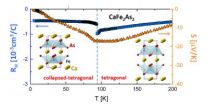(Press-News.org) HOUSTON – (May 5, 2014) – Reform of energy subsidies in oil-exporting countries can reduce carbon emissions and add years to oil exports, according to a new paper from Rice University's Baker Institute for Public Policy.
"Navigating the Perils of Energy-Subsidy Reform in Exporting Countries" was authored by Jim Krane, the Wallace S. Wilson Fellow for Energy Studies at the Baker Institute, who specializes in energy geopolitics. The paper reviews the record of energy-subsidy reforms and argues that big exporters should reduce energy demand by raising prices, and that this can be done without undermining legitimacy of governments that depend on subsidies for political support.
"Removing state subsidies on energy is one of the most politically dangerous acts there is," Krane said. "No government in the world wants to antagonize motorists or raise electricity prices. But previous experience shows that with proper preparation, subsidies can be rolled back without undermining government legitimacy, even in autocracies that use these discounts to preserve popular support."
Whether sold as bulk crude oil and natural gas or as retail electricity, gasoline or diesel, the major exporters of OPEC, Russia and others harbor some of the lowest domestic energy prices in the world. These fossil-fuel subsidies have allowed these countries to distribute resource revenue, bolstering legitimacy for governments, many of which are not democratically elected, Krane said.
"However, subsidy benefits are dwarfed by the harmful consequences of encouraging uneconomic use of energy," Krane said. "These effects include wasted resources, foregone revenue and outsized emissions of carbon dioxide as well as local pollutants such as sulfur oxides and nitrogen oxides. Now, with consumption posing a threat to long-term exports, governments face a heightened need to raise prices that have come to be viewed as entitlements."
Subsidy reform by centralized governments like those in most OPEC countries is even more difficult, since concentration of authority also concentrates the accountability of the head of state. Blame is difficult to evade – unless the leadership can blame outside pressure.
"A vociferous international outcry or pressure from a foreign government or non-governmental organization can provide political cover for governments to enact unpopular measures," he said. "Lobbying by external pressure groups is useful in this sense."
Perhaps the biggest risk implied by reforms of subsidies and social contracts is the possibility of unrest and even the overthrow of governments, Krane said.
Despite the risk, energy subsidies are not untouchable. According to the International Monetary Fund (IMF), all but five of 28 substantial attempts to dismantle subsidies over the past two decades met with some success. The list of reformers includes energy exporters. Indonesia, for example, after failed attempts in 1997 and 2003, successfully raised fuel prices in 2005 and 2008.
Krane said the most encouraging example of reform efforts is that of Iran, the first country in the world to replace major subsidies with a universal cash transfer program for households. Iran's 2010 reform was welcomed by the IMF and, at least initially, by the Iranian public, while halving the world's largest energy-subsidy burden, valued at around $100 billion or a quarter of the 2010 gross domestic product.
Done properly, ending subsidies can add years to the longevity of exports, while keeping global markets supplied and reducing both local pollution and carbon dioxide emissions, Krane said. Mismanaged, eliminating "entitlements" can undermine government legitimacy and trigger unrest. "In the Middle East, where pan-Arab revolts have toppled four governments and left a fifth in civil war, caution remains acute," he said.
Keeping prices low offers a short-term benefit, but in the longer run, giveaways of chief export commodities undermines exports, which invites greater economic and political trouble. Oil exporting regimes depend on export revenues to maintain control.
"Policymakers in exporting states understand that reforming subsidies is their best strategy for preserving political power, since export revenues are a key resource for political stability," Krane concluded. "Thus, constructive external criticism can provide regimes with persuasive tools for swaying public opinion of the need for higher prices and reduced demand."
INFORMATION:
For more information or to schedule an interview with Krane, contact Jeff Falk, associate director of national media relations at Rice, at jfalk@rice.edu or 713-348-6775.
Related materials:
Paper: http://bakerinstitute.org/research/navigating-perils-energy-subsidy-reform-exporting-countries/
Krane bio: http://bakerinstitute.org/experts/jim-krane
Krane on Twitter: http://twitter.com/jimkrane @jimkrane
Follow Rice News and Media Relations via Twitter @RiceUNews.
Founded in 1993, Rice University's Baker Institute ranks among the top 15 university-affiliated think tanks in the world. As a premier nonpartisan think tank, the institute conducts research on domestic and foreign policy issues with the goal of bridging the gap between the theory and practice of public policy. The institute's strong track record of achievement reflects the work of its endowed fellows, Rice University faculty scholars and staff, coupled with its outreach to the Rice student body through fellow-taught classes — including a public policy course — and student leadership and internship programs. Learn more about the institute at http://www.bakerinstitute.org or on the institute's blog, http://blogs.chron.com/bakerblog.
Energy-subsidy reform can be achieved with proper preparation, outside pressure
2014-05-05
ELSE PRESS RELEASES FROM THIS DATE:
Liver cancer screening highly beneficial for people with cirrhosis
2014-05-05
DALLAS – May 5, 2014 – Liver cancer survival rates could be improved if more people with cirrhosis are screened for tumors using inexpensive ultrasound scans and blood tests, according to a review by doctors at UT Southwestern Medical Center.
The meta-analysis of 47 studies involving more than 15,000 patients found that the three-year survival rate was much higher among patients who received liver cancer screening— 51 percent for patients who were screened compared to 28 percent of unscreened patients. The review also found that cirrhosis patients who were screened for ...
Study finds family-based exposure therapy effective treatment for young children with OCD
2014-05-05
PROVIDENCE, R.I. – A new study from the Bradley Hasbro Children's Research Center has found that family-based cognitive behavioral therapy (CBT) is beneficial to young children between the ages of five and eight with Obsessive-Compulsive Disorder (OCD). The study, now published online in JAMA Psychiatry, found developmentally sensitive family-based CBT that included exposure/response prevention (EX/RP) was more effective in reducing OCD symptoms and functional impairment in this age group than a similarly structured relaxation program.
Jennifer Freeman, Ph.D., a staff ...
Tomato turf wars: Benign bug bests salmonella; tomato eaters win
2014-05-05
Scientists from the U.S. Food and Drug Administration (FDA) have identified a benign bacterium that shows promise in blocking Salmonella from colonizing raw tomatoes. Their research is published ahead of print in the journal Applied and Environmental Microbiology.
When applied to Salmonella-contaminated tomato plants in a field study, the bacterium, known as Paenibacillus alvei, significantly reduced the concentration of the pathogen compared to controls.
Outbreaks of Salmonella traced to raw tomatoes have sickened nearly 2,000 people in the US from 2000-2010, killing ...
Physician practice facilitation ensures key medical care reaches children
2014-05-05
Leona Cuttler, MD, knew in her core that the simple act of adding an outside eye could dramatically improve pediatric care.
Today, a study of more than 16,000 patient visits published online in the journal Pediatrics proves Cuttler's thesis correct. The lead investigator on the research project, Cuttler succumbed to cancer late last year. But her colleagues are committed to seeing its lessons disseminated across the country.
"It was an honor to work on this project with Dr. Cuttler," said study first author Sharon B. Meropol, MD, PhD, Assistant Professor, Departments ...
ORNL paper examines clues for superconductivity in an iron-based material
2014-05-05
OAK RIDGE, Tenn., May 5, 2014 – For the first time, scientists have a clearer understanding of how to control the appearance of a superconducting phase in a material, adding crucial fundamental knowledge and perhaps setting the stage for advances in the field of superconductivity.
The paper, published in Physical Review Letters, focuses on a calcium-iron-arsenide single crystal, which has structural, thermodynamic and transport properties that can be varied through carefully controlled synthesis, similar to the application of pressure. To make this discovery, researchers ...
New cause of high blood pressure and heart disease discovered
2014-05-05
Phosphate rich foods include processed cheese, Parmesan, cola, baking powder and most processed foods. Phosphates are widely used in the food industry as preservatives and pH stabilizers. When large quantities of phosphates are consumed, production of the FGF23 hormone is stimulated, which has a negative effect on the cardiovascular system. Reinhold Erben, the head of the Unit of Physiology, Pathophysiology and Biophysics at the Vetmeduni Vienna, warns that "our phosphate consumption is relevant for our state of health."
Over 500 million people around the world suffer ...
No credible evidence to support cardiac risk of testosterone therapy
2014-05-05
New Rochelle, NY, May 5, 2014—Recent articles in the scientific literature and mass media that question the use of testosterone (T) therapy to treat T deficiency, or "low T," and assert the cardiovascular risks of T therapy, are flawed, according to a provocative Guest Editorial in Journal of Men's Health, a peer-reviewed publication from Mary Ann Liebert, Inc., publishers. The article is available free on the Journal of Men's Health website at http://www.liebertpub.com/jmh.
In "Testosterone Therapy and Cardiovascular Risk: A Cautionary Tale" Martin Miner, MD, The Warren ...
When wine hits the right nerve
2014-05-05
If wine leaves a bitter, cotton-like coating on the tongue, neither the sense of taste nor the sense of smell is responsible. The traditional oak barrel character, also called barrique character, is perceived via the trigeminal nerve, which is responsible for, among other things, pain and temperature perception. This is reported in the journal "Chemical Senses" by a research team headed by Prof Dr Dr Dr Hanns Hatt from the Faculty of Biology and Biotechnology at the Ruhr-Universität.
Patients with severed taste nerve do still taste barrique flavour
In collaboration ...
Caring for horses eases symptoms of dementia
2014-05-05
COLUMBUS, Ohio—In the first study of its kind, researchers have determined that spending time with horses eases symptoms of Alzheimer's dementia.
A collaboration between The Ohio State University, an equine therapy center and an adult daycare center found that people with Alzheimer's were able to safely groom, feed and walk horses under supervision—and the experience buoyed their mood and made them less likely to resist care or become upset later in the day.
The small pilot study, which appears in the journal Anthrozoös, suggests that equine therapy—a treatment used ...
Dementia diagnosis twice as likely if older adult has schizophrenia; cancer less likely
2014-05-05
INDIANAPOLIS -- Researchers from Regenstrief Institute and Indiana University who followed over 30,000 older adults for a decade have found the rate of dementia diagnosis for patients with schizophrenia to be twice as high as for patients without this chronic, severe and disabling brain disorder.
"Individuals with serious mental illnesses including schizophrenia appear to be living longer than earlier estimates suggested," said Hugh Hendrie, M.B., Ch.B., D.Sc., the geriatric psychiatrist who led the study. Dr. Hendrie is a Regenstrief Institute investigator, IU Center ...




